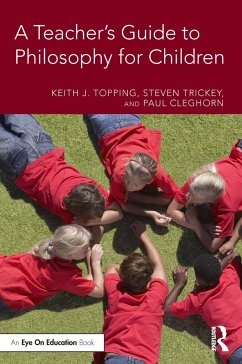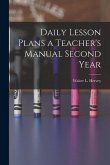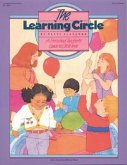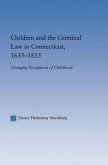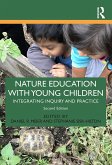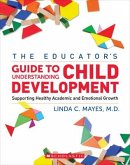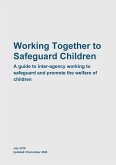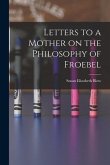- Broschiertes Buch
- Merkliste
- Auf die Merkliste
- Bewerten Bewerten
- Teilen
- Produkt teilen
- Produkterinnerung
- Produkterinnerung
A Teacher's Guide to Philosophy for Children provides educators with the process and structures to engage children in inquiring as a group into 'big' moral, ethical and spiritual questions, while also considering curricular necessities and the demands of national and local standards. Based on the actual experiences of educators in diverse and global classroom contexts, this comprehensive guide gives you the tools you need to introduce philosophical thinking into your classroom, curriculum and beyond. Drawing on research-based educational and psychological models, this book highlights the…mehr
Andere Kunden interessierten sich auch für
![Daily Lesson Plans a Teacher's Manual Second Year Daily Lesson Plans a Teacher's Manual Second Year]() Walter L. HerveyDaily Lesson Plans a Teacher's Manual Second Year21,99 €
Walter L. HerveyDaily Lesson Plans a Teacher's Manual Second Year21,99 €![The Learning Circle: A Preschool Teacher's Guide to Circle Time The Learning Circle: A Preschool Teacher's Guide to Circle Time]() Patty ClaycombThe Learning Circle: A Preschool Teacher's Guide to Circle Time17,99 €
Patty ClaycombThe Learning Circle: A Preschool Teacher's Guide to Circle Time17,99 €![Children and the Criminal Law in Connecticut, 1635-1855 Children and the Criminal Law in Connecticut, 1635-1855]() Nancy Hathaway SteenburgChildren and the Criminal Law in Connecticut, 1635-185571,99 €
Nancy Hathaway SteenburgChildren and the Criminal Law in Connecticut, 1635-185571,99 €![Nature Education with Young Children Nature Education with Young Children]() Nature Education with Young Children64,99 €
Nature Education with Young Children64,99 €![The Educator's Center Guide to Understanding Child Development The Educator's Center Guide to Understanding Child Development]() Linda MayesThe Educator's Center Guide to Understanding Child Development31,99 €
Linda MayesThe Educator's Center Guide to Understanding Child Development31,99 €![Working Together to Safeguard Children Working Together to Safeguard Children]() Department for EducationWorking Together to Safeguard Children21,99 €
Department for EducationWorking Together to Safeguard Children21,99 €![Letters to a Mother on the Philosophy of Froebel Letters to a Mother on the Philosophy of Froebel]() Susan Elizabeth BlowLetters to a Mother on the Philosophy of Froebel26,99 €
Susan Elizabeth BlowLetters to a Mother on the Philosophy of Froebel26,99 €-
-
-
A Teacher's Guide to Philosophy for Children provides educators with the process and structures to engage children in inquiring as a group into 'big' moral, ethical and spiritual questions, while also considering curricular necessities and the demands of national and local standards. Based on the actual experiences of educators in diverse and global classroom contexts, this comprehensive guide gives you the tools you need to introduce philosophical thinking into your classroom, curriculum and beyond. Drawing on research-based educational and psychological models, this book highlights the advantages gained by students who regularly participate in philosophical discussion: from building cognitive and social/emotional development, to becoming more informed citizens. Helpful tools and supplementary online resources offer additional frameworks for supporting and sustaining a higher level of thinking and problem-solving among your students. This practical guide is essential reading for teachers, coaches and anyone wondering how you can effectively teach philosophy in your classroom.
Hinweis: Dieser Artikel kann nur an eine deutsche Lieferadresse ausgeliefert werden.
Hinweis: Dieser Artikel kann nur an eine deutsche Lieferadresse ausgeliefert werden.
Produktdetails
- Produktdetails
- Verlag: Routledge
- Seitenzahl: 190
- Erscheinungstermin: 25. Juni 2019
- Englisch
- Abmessung: 229mm x 152mm x 10mm
- Gewicht: 284g
- ISBN-13: 9781138393264
- ISBN-10: 1138393266
- Artikelnr.: 57055674
- Herstellerkennzeichnung
- Libri GmbH
- Europaallee 1
- 36244 Bad Hersfeld
- gpsr@libri.de
- Verlag: Routledge
- Seitenzahl: 190
- Erscheinungstermin: 25. Juni 2019
- Englisch
- Abmessung: 229mm x 152mm x 10mm
- Gewicht: 284g
- ISBN-13: 9781138393264
- ISBN-10: 1138393266
- Artikelnr.: 57055674
- Herstellerkennzeichnung
- Libri GmbH
- Europaallee 1
- 36244 Bad Hersfeld
- gpsr@libri.de
Keith J. Topping is Professor at the University of Dundee, UK. Steven Trickey is Scholar in Residence at American University, USA. Paul Cleghorn is an education consultant at Aude Education, UK.
1. Introducing Thinking Through Philosophy For Whom Is This Book Written? Clarifying the Term `Philosophy for Children
Teachers `Making a Difference
Through Philosophical Inquiry Philosophical Inquiry: Both `Practical
and `Evidence Based
A Psychological and Educational Perspective on a Philosophical Process The Structure of This Book References 2. Aims and Process of Philosophy for Children What is Philosophy for Children? What Makes an Inquiry Philosophical? What Are the Aims of Philosophy for Children? What Skills, Attitudes and Knowledge Do Teachers Need to Facilitate Inquiries? Are Children Capable of Philosophical Thinking? Developing Teachers
Facilitation Skills Does Inquiry Need to Be Philosophical? Infusing Philosophical Inquiry into Other Subjects Space for Philosophy for Children in a Crowded Curriculum What This Chapter Has Been About References Chapter 3: From Theory into Practice The Need for a Structure What is Philosophical Inquiry in Practical Terms? What is a Community of Inquiry? The Rational and Moral Dimensions Skillful Questioning Useful Strategies for Building the Inquiry Thinking Development, Emotional Intelligence and Spiritual Intelligence The Seven Steps to Philosophical Inquiry: Lesson Plan The Three Stages of Development Making a Start What about Kindergarten? Sample Themes What Next? Route Map for Introducing P4C Through TTP References 4. From Small to Large: Different Contexts for Philosophical Inquiry Lunch Club/After-School Club A Single Class Whole School Beacon School The School District Program External Provision of P4C College and Community Summary References 5. How Inquiry Promotes More Effective Learning How Philosophical Inquiry Improves Learning How Teachers Can Support Students Construct Their Thinking and Learning Transfer Across Subject Boundaries and Beyond Challenging Themes: An Example Beyond the Curriculum Higher Order Thinking Communities Support Learning Theoretical Perspectives Summary References 6. Educating Students to Think: The Contribution of Philosophical Inquiry What Are Some of the Issues Around Teaching Thinking? Why Promote Thinking and Problem Solving in the Classroom? Critical Thinking Which Students Do We Teach to Think? An Introduction to Logical Reasoning Skills Creative Thinking Intelligent Students! The Challenge of Thinking References 7. Communication, Dialogue and Social/Emotional Development Thought and Feeling Are Inseparable Can Philosophical Inquiry Help Re-Educate Emotions? Parallels Between Philosophical Inquiry and `Cognitive Behavioral Therapy
Participation, Communication and Social Wellbeing Communication in the Classroom Improving Communication and Dialogue in the Classroom Summary References 8. Does P4C Work? Evaluation Research Why Evaluate the Effectiveness of Thinking Programs? Placing Philosophy for Children Within Thinking Skills Interventions Early Evaluation Studies of Philosophy for Children Systematic Reviews of Philosophy for Children Evaluation of the Thinking Through Philosophy Program What Research Methods Are Best for Evaluating Effects of Philosophy for Children? Sustainability Overall Conclusions About the Effects of Philosophy for Children References 9. Evaluating Philosophical Inquiry Participant Perceptions Observation Research Design Measures Generalization and Maintenance Analysis of Data Evaluation Results Feedback and Dissemination References 10. Truth, Democracy and Classroom Communities of Inquiry Is Truth Problematic? Should Teachers Be Concerned? Is There a Threat to Healthy Democracies? Conspiracy Theorists and What Is Truth Historical Concerns Over Truth Concerns About Truth in Other Countries What Can Be Done? Cognitive Biases Complicate `Truth
Overcoming Bias A Brief Note on Philosophical Ideas About Truth Concluding Comments on Participation and Democracy References 11. Lessons Learned in Sustaining and Embedding An Example What You Need to Do Habits and Dispositions Cost-Effectiveness Cautionary Tales: Sustaining over Time Skills for the World Skills for the Future Final Thoughts
Teachers `Making a Difference
Through Philosophical Inquiry Philosophical Inquiry: Both `Practical
and `Evidence Based
A Psychological and Educational Perspective on a Philosophical Process The Structure of This Book References 2. Aims and Process of Philosophy for Children What is Philosophy for Children? What Makes an Inquiry Philosophical? What Are the Aims of Philosophy for Children? What Skills, Attitudes and Knowledge Do Teachers Need to Facilitate Inquiries? Are Children Capable of Philosophical Thinking? Developing Teachers
Facilitation Skills Does Inquiry Need to Be Philosophical? Infusing Philosophical Inquiry into Other Subjects Space for Philosophy for Children in a Crowded Curriculum What This Chapter Has Been About References Chapter 3: From Theory into Practice The Need for a Structure What is Philosophical Inquiry in Practical Terms? What is a Community of Inquiry? The Rational and Moral Dimensions Skillful Questioning Useful Strategies for Building the Inquiry Thinking Development, Emotional Intelligence and Spiritual Intelligence The Seven Steps to Philosophical Inquiry: Lesson Plan The Three Stages of Development Making a Start What about Kindergarten? Sample Themes What Next? Route Map for Introducing P4C Through TTP References 4. From Small to Large: Different Contexts for Philosophical Inquiry Lunch Club/After-School Club A Single Class Whole School Beacon School The School District Program External Provision of P4C College and Community Summary References 5. How Inquiry Promotes More Effective Learning How Philosophical Inquiry Improves Learning How Teachers Can Support Students Construct Their Thinking and Learning Transfer Across Subject Boundaries and Beyond Challenging Themes: An Example Beyond the Curriculum Higher Order Thinking Communities Support Learning Theoretical Perspectives Summary References 6. Educating Students to Think: The Contribution of Philosophical Inquiry What Are Some of the Issues Around Teaching Thinking? Why Promote Thinking and Problem Solving in the Classroom? Critical Thinking Which Students Do We Teach to Think? An Introduction to Logical Reasoning Skills Creative Thinking Intelligent Students! The Challenge of Thinking References 7. Communication, Dialogue and Social/Emotional Development Thought and Feeling Are Inseparable Can Philosophical Inquiry Help Re-Educate Emotions? Parallels Between Philosophical Inquiry and `Cognitive Behavioral Therapy
Participation, Communication and Social Wellbeing Communication in the Classroom Improving Communication and Dialogue in the Classroom Summary References 8. Does P4C Work? Evaluation Research Why Evaluate the Effectiveness of Thinking Programs? Placing Philosophy for Children Within Thinking Skills Interventions Early Evaluation Studies of Philosophy for Children Systematic Reviews of Philosophy for Children Evaluation of the Thinking Through Philosophy Program What Research Methods Are Best for Evaluating Effects of Philosophy for Children? Sustainability Overall Conclusions About the Effects of Philosophy for Children References 9. Evaluating Philosophical Inquiry Participant Perceptions Observation Research Design Measures Generalization and Maintenance Analysis of Data Evaluation Results Feedback and Dissemination References 10. Truth, Democracy and Classroom Communities of Inquiry Is Truth Problematic? Should Teachers Be Concerned? Is There a Threat to Healthy Democracies? Conspiracy Theorists and What Is Truth Historical Concerns Over Truth Concerns About Truth in Other Countries What Can Be Done? Cognitive Biases Complicate `Truth
Overcoming Bias A Brief Note on Philosophical Ideas About Truth Concluding Comments on Participation and Democracy References 11. Lessons Learned in Sustaining and Embedding An Example What You Need to Do Habits and Dispositions Cost-Effectiveness Cautionary Tales: Sustaining over Time Skills for the World Skills for the Future Final Thoughts
1. Introducing Thinking Through Philosophy For Whom Is This Book Written? Clarifying the Term `Philosophy for Children
Teachers `Making a Difference
Through Philosophical Inquiry Philosophical Inquiry: Both `Practical
and `Evidence Based
A Psychological and Educational Perspective on a Philosophical Process The Structure of This Book References 2. Aims and Process of Philosophy for Children What is Philosophy for Children? What Makes an Inquiry Philosophical? What Are the Aims of Philosophy for Children? What Skills, Attitudes and Knowledge Do Teachers Need to Facilitate Inquiries? Are Children Capable of Philosophical Thinking? Developing Teachers
Facilitation Skills Does Inquiry Need to Be Philosophical? Infusing Philosophical Inquiry into Other Subjects Space for Philosophy for Children in a Crowded Curriculum What This Chapter Has Been About References Chapter 3: From Theory into Practice The Need for a Structure What is Philosophical Inquiry in Practical Terms? What is a Community of Inquiry? The Rational and Moral Dimensions Skillful Questioning Useful Strategies for Building the Inquiry Thinking Development, Emotional Intelligence and Spiritual Intelligence The Seven Steps to Philosophical Inquiry: Lesson Plan The Three Stages of Development Making a Start What about Kindergarten? Sample Themes What Next? Route Map for Introducing P4C Through TTP References 4. From Small to Large: Different Contexts for Philosophical Inquiry Lunch Club/After-School Club A Single Class Whole School Beacon School The School District Program External Provision of P4C College and Community Summary References 5. How Inquiry Promotes More Effective Learning How Philosophical Inquiry Improves Learning How Teachers Can Support Students Construct Their Thinking and Learning Transfer Across Subject Boundaries and Beyond Challenging Themes: An Example Beyond the Curriculum Higher Order Thinking Communities Support Learning Theoretical Perspectives Summary References 6. Educating Students to Think: The Contribution of Philosophical Inquiry What Are Some of the Issues Around Teaching Thinking? Why Promote Thinking and Problem Solving in the Classroom? Critical Thinking Which Students Do We Teach to Think? An Introduction to Logical Reasoning Skills Creative Thinking Intelligent Students! The Challenge of Thinking References 7. Communication, Dialogue and Social/Emotional Development Thought and Feeling Are Inseparable Can Philosophical Inquiry Help Re-Educate Emotions? Parallels Between Philosophical Inquiry and `Cognitive Behavioral Therapy
Participation, Communication and Social Wellbeing Communication in the Classroom Improving Communication and Dialogue in the Classroom Summary References 8. Does P4C Work? Evaluation Research Why Evaluate the Effectiveness of Thinking Programs? Placing Philosophy for Children Within Thinking Skills Interventions Early Evaluation Studies of Philosophy for Children Systematic Reviews of Philosophy for Children Evaluation of the Thinking Through Philosophy Program What Research Methods Are Best for Evaluating Effects of Philosophy for Children? Sustainability Overall Conclusions About the Effects of Philosophy for Children References 9. Evaluating Philosophical Inquiry Participant Perceptions Observation Research Design Measures Generalization and Maintenance Analysis of Data Evaluation Results Feedback and Dissemination References 10. Truth, Democracy and Classroom Communities of Inquiry Is Truth Problematic? Should Teachers Be Concerned? Is There a Threat to Healthy Democracies? Conspiracy Theorists and What Is Truth Historical Concerns Over Truth Concerns About Truth in Other Countries What Can Be Done? Cognitive Biases Complicate `Truth
Overcoming Bias A Brief Note on Philosophical Ideas About Truth Concluding Comments on Participation and Democracy References 11. Lessons Learned in Sustaining and Embedding An Example What You Need to Do Habits and Dispositions Cost-Effectiveness Cautionary Tales: Sustaining over Time Skills for the World Skills for the Future Final Thoughts
Teachers `Making a Difference
Through Philosophical Inquiry Philosophical Inquiry: Both `Practical
and `Evidence Based
A Psychological and Educational Perspective on a Philosophical Process The Structure of This Book References 2. Aims and Process of Philosophy for Children What is Philosophy for Children? What Makes an Inquiry Philosophical? What Are the Aims of Philosophy for Children? What Skills, Attitudes and Knowledge Do Teachers Need to Facilitate Inquiries? Are Children Capable of Philosophical Thinking? Developing Teachers
Facilitation Skills Does Inquiry Need to Be Philosophical? Infusing Philosophical Inquiry into Other Subjects Space for Philosophy for Children in a Crowded Curriculum What This Chapter Has Been About References Chapter 3: From Theory into Practice The Need for a Structure What is Philosophical Inquiry in Practical Terms? What is a Community of Inquiry? The Rational and Moral Dimensions Skillful Questioning Useful Strategies for Building the Inquiry Thinking Development, Emotional Intelligence and Spiritual Intelligence The Seven Steps to Philosophical Inquiry: Lesson Plan The Three Stages of Development Making a Start What about Kindergarten? Sample Themes What Next? Route Map for Introducing P4C Through TTP References 4. From Small to Large: Different Contexts for Philosophical Inquiry Lunch Club/After-School Club A Single Class Whole School Beacon School The School District Program External Provision of P4C College and Community Summary References 5. How Inquiry Promotes More Effective Learning How Philosophical Inquiry Improves Learning How Teachers Can Support Students Construct Their Thinking and Learning Transfer Across Subject Boundaries and Beyond Challenging Themes: An Example Beyond the Curriculum Higher Order Thinking Communities Support Learning Theoretical Perspectives Summary References 6. Educating Students to Think: The Contribution of Philosophical Inquiry What Are Some of the Issues Around Teaching Thinking? Why Promote Thinking and Problem Solving in the Classroom? Critical Thinking Which Students Do We Teach to Think? An Introduction to Logical Reasoning Skills Creative Thinking Intelligent Students! The Challenge of Thinking References 7. Communication, Dialogue and Social/Emotional Development Thought and Feeling Are Inseparable Can Philosophical Inquiry Help Re-Educate Emotions? Parallels Between Philosophical Inquiry and `Cognitive Behavioral Therapy
Participation, Communication and Social Wellbeing Communication in the Classroom Improving Communication and Dialogue in the Classroom Summary References 8. Does P4C Work? Evaluation Research Why Evaluate the Effectiveness of Thinking Programs? Placing Philosophy for Children Within Thinking Skills Interventions Early Evaluation Studies of Philosophy for Children Systematic Reviews of Philosophy for Children Evaluation of the Thinking Through Philosophy Program What Research Methods Are Best for Evaluating Effects of Philosophy for Children? Sustainability Overall Conclusions About the Effects of Philosophy for Children References 9. Evaluating Philosophical Inquiry Participant Perceptions Observation Research Design Measures Generalization and Maintenance Analysis of Data Evaluation Results Feedback and Dissemination References 10. Truth, Democracy and Classroom Communities of Inquiry Is Truth Problematic? Should Teachers Be Concerned? Is There a Threat to Healthy Democracies? Conspiracy Theorists and What Is Truth Historical Concerns Over Truth Concerns About Truth in Other Countries What Can Be Done? Cognitive Biases Complicate `Truth
Overcoming Bias A Brief Note on Philosophical Ideas About Truth Concluding Comments on Participation and Democracy References 11. Lessons Learned in Sustaining and Embedding An Example What You Need to Do Habits and Dispositions Cost-Effectiveness Cautionary Tales: Sustaining over Time Skills for the World Skills for the Future Final Thoughts

